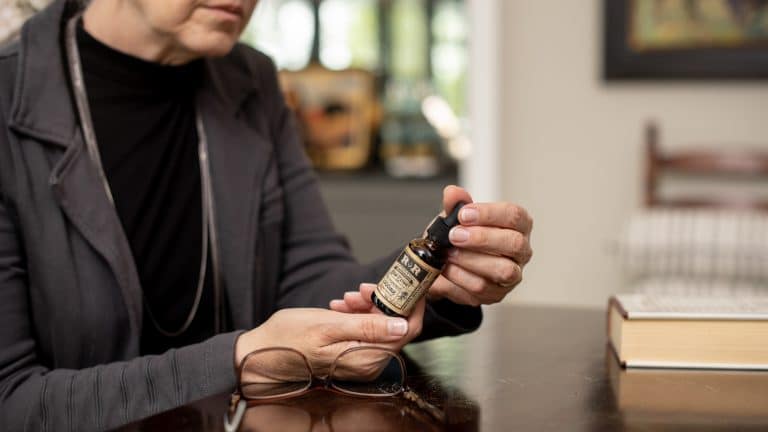CBD Oil for Parkinson’s: Benefits, Dosage, and Side Effects

Seeing how most prescription medications only add to the deteriorating quality of life, it’s no wonder that an increasing number of people is turning to alternative treatments, such as using CBD oil for Parkinson’s.
In fact, over 10 million people worldwide live with Parkinson’s, and some 60,000 new cases are recorded every year in the US alone. And thanks to CBD, many of them now lead normal, happy lives.
What Is Parkinson’s Disease
Parkinson’s disease is a long-term degenerative disorder that causes dopamine-producing cells in the brain to die.
Though symptoms may vary, the most common signs of PD include tremors, slowed movement, slurred speech, and difficulty walking. Other non-motor symptoms of this condition can range from sleep disorders and depression to weight loss and chronic fatigue, including psychosis and hallucinations.
What Is the Typical Treatment for PD
The most commonly prescribed treatment for Parkinson’s is Carbidopa-levodopa or Sinemet. So far, there aren’t any known interactions between CBD oil and Sinemet, which is all the more reason to use CBD as a viable treatment option for Parkinson’s disease.
In essence, levodopa is a natural chemical that gets converted to dopamine in our bodies and is used in combination with carbidopa to slow down some of the effects.
In addition to dizziness, insomnia, nausea, and headaches, one of the more prevalent side effects of levodopa is Dyskinesia (jerky, involuntary movements), which occurs due to prolonged use. Another problem with this Parkinson’s disease treatment is that levodopa does very little to alleviate some of the nonmotor symptoms of the condition.
What’s more, Nourianz, the newest drug approved by the FDA to treat Parkinson’s “off” time, also comes with side effects such as dyskinesia, dizziness, and constipation.
CBD Oil As a Treatment for Parkinson’s
Does CBD oil work for Parkinson’s? One of the crucial roles of our body’s endocannabinoid system is the control of movement, which has led experts to examine the link between ECS and motor disorders, commonly associated with diseases like Parkinson’s and Huntington’s.
In addition, researchers believe there is a direct relationship between the endocannabinoid receptors in the brain and the neurons affected by these degenerative illnesses.
Yet, despite the connection, there hasn’t been any conclusive evidence for either the FDA or medical professionals, in general, to approve CBD oil for Parkinson’s disease treatment. And according to experts, more research is needed to determine the potential therapeutic benefits of CBD oil.
Parkinson’s and Medical Marijuana Research
The legal status of cannabis is one of the biggest hurdles in researching medical marijuana benefits. Unless cannabis is legalized on a federal level, Parkinson’s and CBD studies will remain limited.
Another issue is the stigma commonly associated with cannabis use and the lack of education among healthcare professionals on the benefits of medical marijuana.
- Based on one survey, 90% of doctors who go to medical schools receive no formal education regarding marijuana.
- On a positive note, a few universities are starting to change this trend by offering courses on medical marijuana, such as CSU Pueblo, Lake Superior State University, and Northern Michigan University.
- Moreover, it seems that Parkinson’s Disease and CBD Oil go hand in hand, as one survey shows that 73% of PD patients use various types of cannabis (CBD and THC) for their condition.
CBD Oil & Parkinson’s Symptoms
Let’s take a look at how CBD could help patients with Parkinson’s.
Tremors and CBD
Tremors are one of the most common symptoms of Parkinson’s and one of the most troublesome.
Typically, tremors affect PD patients while resting or sleeping, and they usually occur in the extremities. Although some PD sufferers also report internal tremors (in the chest or abdomen).
Studies have been done to determine whether CBD oil affects tremors. No significant improvements were found from administering pure CBD for Parkinson’s tremors. Yet, it’s worth mentioning that a combination of THC and CBD significantly improved resting tremors and rigidity with little or no side effects.
One of the medical benefits of THC and CBD is anxiety relief, which is essential for PD patients as stress and anxiety can increase the frequency and intensity of tremors.
In fact, a recent survey suggests that 8% of PD patients use cannabis-based products, and over 40% believe cannabis helped them manage pain and muscle cramps. At the same time, over 20% of respondents claim it helped them with tremors, stiffness, and restless leg syndrome.
Parkinson’s and CBD Oil for Pain Management
Even though pain is not usually associated with this disease, almost 75% of PD patients experience some type of discomfort during the condition, mainly due to rigidity or muscle stiffness. The study also showed that medicinal marijuana (which contains both THC and CBD) helped patients manage their pain better.
Furthermore, animal studies indicate that CBD treatment alone can reduce pain and inflammation due to its anti-inflammatory properties.
CBD for Sleep Issues
Sleep disruptions, such as vivid dreams, nightmares, or RLS (restless leg syndrome) and difficulties falling and staying asleep, often accompany Parkinson’s disease.
Cannabidiol is already known to induce sleep and treat some of the symptoms of sleeplessness. Moreover, a 2014 observational study went a step further. Namely, it showed considerable improvements in sleep scores among the 22 PD participants included in the research.
CBD Oil for Parkinson’s Hallucinations and Psychosis
Around a third of patients with Parkinson’s also experience psychosis, most commonly hallucinations and delusions. Psychosis in PD patients increases the longer a person lives with the disease and is caused by the same medication used to treat the condition in some cases.
CBD May Help with PD-Related Psychosis
In a small 2009 study, six PD patients diagnosed with psychosis for at least three months were given an oral dose of CBD for four weeks. And the results showed a considerable decrease in psychotic symptoms.
The study didn’t find any adverse effects from CBD use on motor functions or negative effects on general well-being and health.
In 2020, a new clinical trial was announced at King’s College London in the UK to test the possible effects of CBD on hallucinations and delusions among people who have Parkinson’s.
Hopefully, this research, and others like it, will help generate more interest and encourage additional studies into the benefits of CBD oil for Parkinson’s.
CBD Improves the Quality of Life for PD Patients
Living with Parkinson’s isn’t easy. This disease, which only gets worse with time, can seriously jeopardize a person’s ability to lead a normal life. Luckily, studies show that CBD treatment can offer some relief:
- A study of 21 PD patients that used CBD and a placebo found that the participants who received CBD experienced improvements in their quality of life after just six weeks.
- Another study on CBD oil and Parkinson’s that included 119 patients also pointed out that CBD plays a significant role in the patients’ well-being and quality of life. And even though motor and general symptoms did not improve, findings showed a higher quality of life score.
CBD Oil as Prevention for Parkinson’s
There are some indications that CBD use could prevent PD. Yet, up to now, mainly animal studies have been conducted. Hence, we lack data to determine whether these claims hold any promise.
Best CBD Oil for Treating Parkinson’s
Which CBD oil is best for Parkinson’s disease depends on several factors. The only way you can make sure that you buy a high-quality CBD product is to shop smart.
- Read the label. Check how much CBD and THC the product contains.
- Check for third-party testing. Companies with independent evaluation facilities that test their products usually provide higher quality.
- Check online reviews to make an informed and educated decision.
- Check the sourcing location. Knowing where the product comes from and how the plant is grown is essential. Namely, some states require growers to adhere to stricter quality assurance regulations regarding the use of pesticides or chemicals.
- Check the oil type. Full or broad-spectrum CBD oil will probably be better than an isolate.
- Choose where you buy CBD. The best place to find CBD oil is from licensed dispensaries.
How to Administer CBD Oil for Parkinson’s Disease
There are several ways that one can take CBD:
- CBD oils and tinctures can be used sublingually where a few drops are placed under the tongue and absorbed quickly into the bloodstream. You can also add them to food and beverages or apply them to the skin. Highly recommended for PD patients suffering from localized pain and muscle stiffness.
- Capsules and pills are beneficial to PD patients who cannot correctly dose liquids due to tremors. When taking CBD oil with pills and capsules, the effect is a bit delayed. Nevertheless, the effects are felt for 4 hours or longer once it kicks in.
- Edibles. Although they can be effective, edibles are not recommended for people with Parkinson’s due to inaccurate precise dosage compared to other administration methods.
- Smoking cannabis — cannabis can be smoked, vaped, or inhaled. However, experts advise PD patients to avoid smoking as it may cause damage to the lungs or throat.
CBD Oil Dosage for Parkinson’s
How much and how often can you take CBD oil? When it comes to PD (and other diseases), it’s best to start with low doses and work your way up if necessary in order to determine the CBD oil recommended dosage for Parkinson’s in your particular case.
The baseline dosage, around 2–5mg, two or three times a day, should be maintained for about seven days, after which patients can slowly increase the dosage by 1–2mg a day if they do not see any results.
Some studies indicate that 150mg over four weeks alleviates psychotic symptoms, whereas 75–300mg of CBD oil improves REM sleep disorders, albeit the dosage may vary according to body weight and method of consumption.
The good news is that most CBD products on the market either contain the required dose (edibles, pills, and vapes) or come with droppers (oils and tinctures), making dosing CBD oil relatively easy.
Side Effects of CBD
Most of the research conducted on cannabidiol shows that CBD treatment is usually well-tolerated with little or no side effects, though not everyone reacts the same way.
Also, CBD is known to interact with some other medications. Hence, if you plan on using CBD oil for Parkinson’s, make sure you check that cannabidiol doesn’t interfere with your prescribed treatment.
Summing Up
Thanks to its sedative and anti-inflammatory effects, cannabidiol has the potential to offer relief from some of the most disruptive symptoms of Parkinson’s disease.
Nevertheless, more research is needed, not just to substantiate anecdotal accounts but also to discover other beneficial properties of CBD.
With science becoming more interested in cannabidiol and its effects and patients shifting their focus to natural and alternative remedies, as opposed to traditional medication, there is hope that someday CBD oil will be approved as a valid treatment.
FAQs
Does CBD oil work for Parkinson's?
According to studies and anecdotal evidence, CBD can help people deal with PD symptoms. Although more research is needed, what we know thus far, based on study results and anecdotal evidence, is that CBD and THC can potentially help with:
- tremors
- psychosis
- anxiety
- pain
- insomnia
- stiffness
Some studies conducted on animals even indicate that CBD could prevent PD. However, the FDA hasn’t approved cannabis as a treatment for Parkinson’s disease yet.
What helps with Parkinson's tremors?
The usual treatment for tremors can range from first-line medication (levodopa and dopamine agonists) to second-line medications, such as clozapine, clonazepam, or propranolol.
In some cases, patients might not respond to the medication, meaning neurosurgical intervention might be needed.
Although this type of surgery is effective and carries little to no risk for the patient, it is surgery nevertheless and should be considered only as a last resort.
How much CBD does it take to help with tremors?
Since CBD taken in high doses can potentially increase tremors, make sure you start with a low dosage. The optimal dosage would be 2–5 mg CBD taken 2–3 times a day.
You should maintain the mentioned dosage for one week. If there are no effects, you can increase the dosage by 1–2 mg a day.
Again, avoid taking high doses of CBD. Moreover, the correct dosage will also depend on your weight and metabolism.
Which oil is best for Parkinson's disease?
Full-spectrum oil — THC and CBD are considered the most effective in treating PD symptoms, rather than using just one of them.
CBD oil for Parkinson’s containing both THC and CBD can help with dyskinesia, or involuntary muscle movement, which usually occurs as a side-effect of traditional treatment for Parkinson’s.





